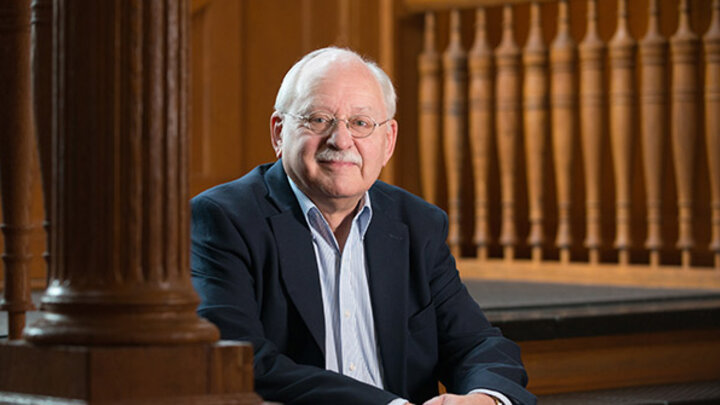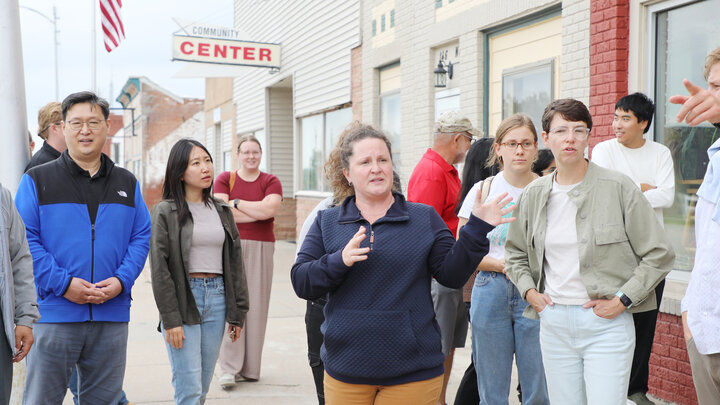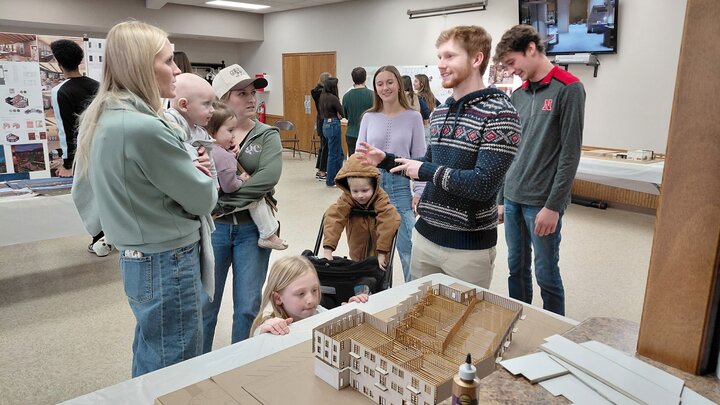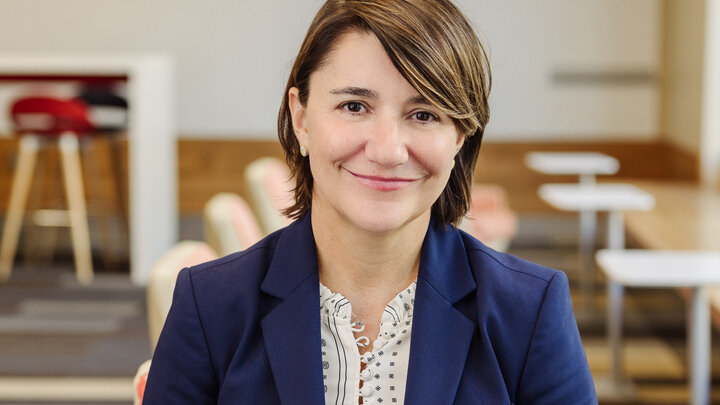The UNL College of Architecture extends our warmest wishes to Community and Regional Planning (CRP) Director Gordon Scholz as he prepares for retirement this summer. At the time of Scholz’s retirement, he has faithfully served the college and its alumni for over 46 years, starting as an assistant professor in 1974 at the time the College of Architecture was established. By 1989 he was full professor and chair of the Department of Community and Regional Planning; he later served as program director. He served in these administrative roles at three different times, totaling 29 years.
Scholz is a native Nebraskan, growing up in Bellevue. He earned his Bachelor of Architecture degree at UNL and graduate degrees in urban planning and architecture at the University of Illinois at Urbana-Champaign. He is a member of the American Institute of Certified Planners and is a licensed architect in the state of Nebraska.
Under his leadership, the Community and Regional Planning program initiated dual degree programs to connect the Master of Community and Regional Planning (MCRP) degree with other UNL graduate degree programs including Architecture’s M.Arch., Law’s JD and Civil Engineering’s MS-CE degree; and coordinated eight consecutive successful accreditation and re-accreditation reviews for the MCRP Program.
“Gordon served as a core founder, a life-time mentor, an outstanding educator, a true leader and a well-respected planner for the planning program at UNL and the planning profession in Nebraska and the nation,” said Community and Regional Planning Professor Zhenghong Tang.
Scholz’s contributions across the university demonstrate his commitment to academic excellence. His service has included membership on the UNL Faculty Senate, the Faculty Senate Executive Committee and the Center for Great Plains Studies Board of Governors, among 35 other UNL service positions throughout his employment.
At the national level, Scholz has served on the board of the Urban Design & Preservation Division of the American Planning Association, as well as a site visitor for the Planning Accreditation Board. He served twice as president of the Nebraska Chapter of the American Planning Association (APA) and was recipient of the Mitsuo Kawamoto Excellence in Planning Award from the Nebraska Chapter APA and the Wozniak-Selander Award for a Planning Pioneer from the Nebraska Planning and Zoning Association.
Scholz’s work over the last four decades has made a significant impact for Nebraska communities. In addition to his community service positions, such as board member of the Preservation Association of Lincoln and member of the City of Lincoln’s Urban Design Committee, he has led numerous studio/course-based collaborations with community organizations across Nebraska. Most recently, Scholz galvanized a program effort to help the village of Winslow, Nebraska, with their flood recovery efforts and explored the option of relocating their community to higher ground.
Additionally, Scholz has led multiple UNL graduate planning studio collaborations with NeighborWorks Lincoln, the Lincoln/Lancaster County Planning Department and the City of Lincoln Urban Development Department on various stages of community planning in Lincoln’s older neighborhoods. He has worked with faculty colleagues and student teams to help various areas in Nebraska with community planning, including projects in Blair, Columbus, Crete, Custer County, Fremont, Grand Island, Oakland, Stromsburg, Superior, Valentine, and Wahoo.
“In leading planning studios, Gordon brought together community partners and planning students to produce valuable neighborhood plans,” said MCRP alumnus and NeighborWorks Lincoln’s Community Specialist Grant Daily. “Planning students received the benefit of hands-on planning experience in their local community. Local organizations, like NeighborWorks, gained valuable insight on existing neighborhood conditions and were able to consider new strategies for neighborhood improvement. These documents have a lasting value, as they continue to inform our actions in Lincoln’s core neighborhoods. Gordon’s community relationships in Lincoln and knowledge of Lincoln’s history were especially valuable in making sure that these planning exercises were grounded in local context, and featured the voice of Lincoln’s residents. We are proud of Gordon’s lasting contributions to planning education at the University of Nebraska–Lincoln, and are thankful to have had the privilege to work with him and his students.”
“Collaborations don't happen with UNL unless a personal connection is made. Gordon was key in making these projects work, which provides such a key learning experience for students and help with work in the community as well,” said NeighborWorks’ Community Builder Pat Anderson-Sifuentez.
As an alumnus of UNL’s architecture class of 1968, Scholz was a natural liaison with his graduating class and helped garner one of the strongest, most impactful alumni cohorts the college enjoys today. The class of 1968 has regularly held reunions and collectively raised over $68,000 in periodic campaigns among its members to establish an endowed Class of 1968 Scholarship Fund in the University of Nebraska Foundation.
“Gordon has been a solid supporter of the College of Architecture and the Community and Regional Planning Program. He has been a steady presence, providing insightful leadership within the academy and throughout the state of Nebraska. His impact can be felt through his thoughtful teachings, positive efforts and caring attention,” said Sharon S. Baum Kuska, associate dean with the College of Architecture. “He has had an incredible career at the University of Nebraska, through which he has touched the lives of generations of students and colleagues. I will miss his laughter and friendship, and wish him well in his retirement.”
“We would all like to thank Gordon for his dedication, service and leadership to this college and the university over these 46 remarkable years,” commented Ankerson. “His impactful insight and invaluable contributions to our students’ education, the advancement of the program and unrelenting community service is an inspiration to us all. He has left a lasting footprint in each of our personal lives as well as a legacy for the college and the CRP program.”




